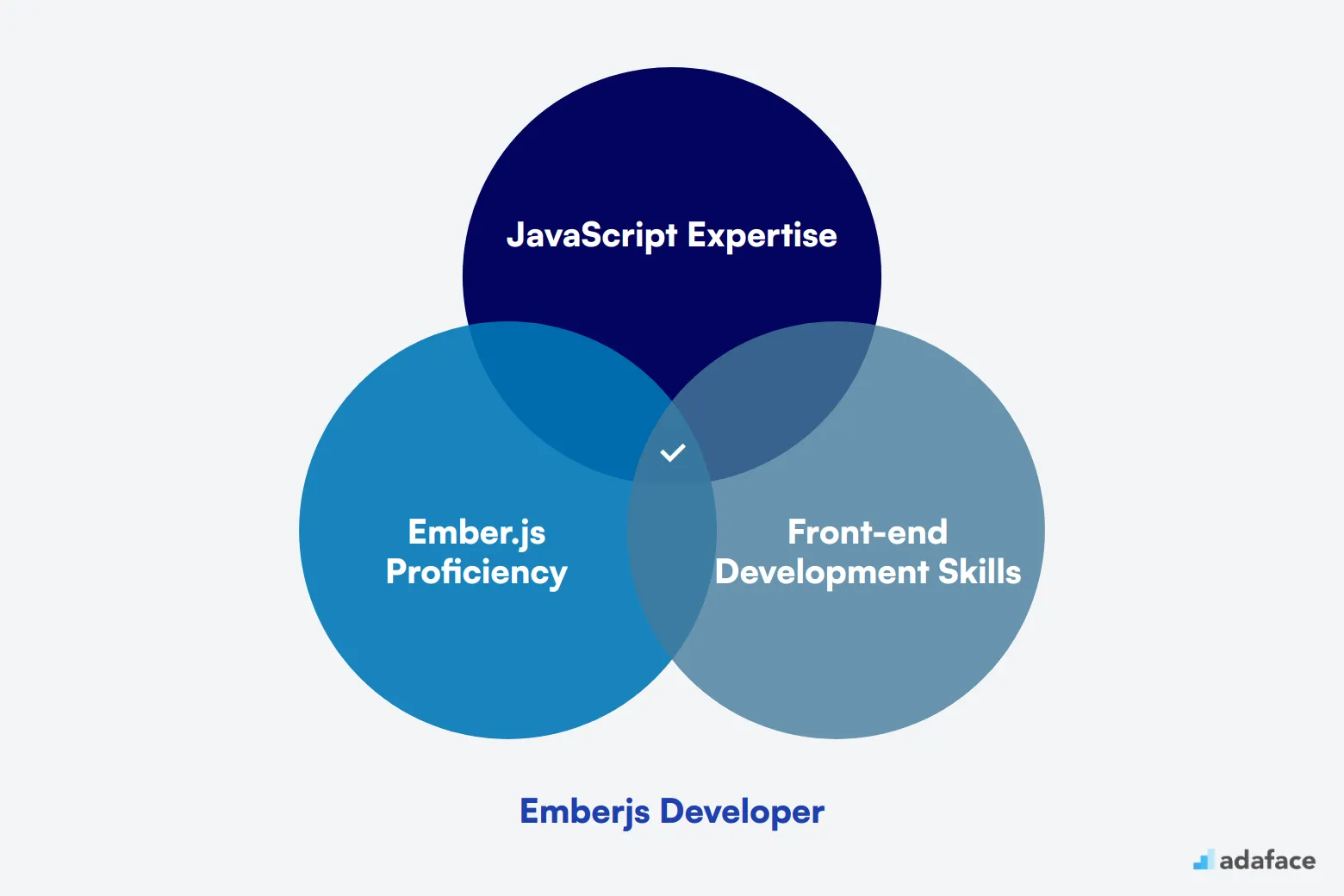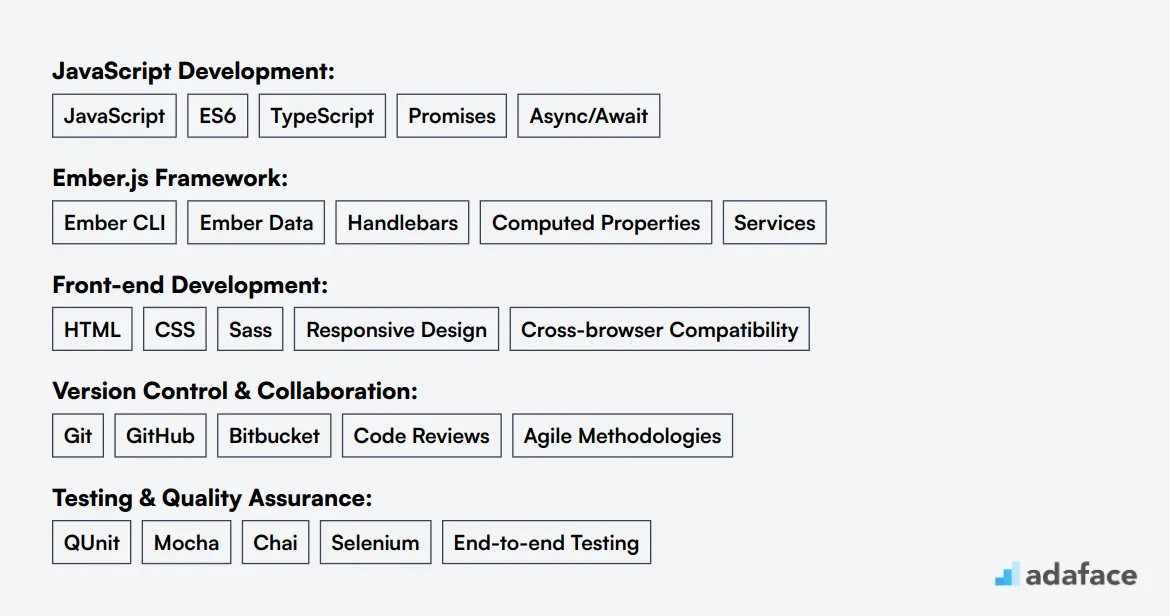Hiring Ember.js developers can be a challenge for recruiters who aren't familiar with the intricacies of this JavaScript framework. Many companies underestimate the importance of finding developers with specific Ember.js expertise, often settling for general JavaScript developers instead. This approach can lead to slower development cycles and suboptimal application performance.
This guide aims to equip recruiters and hiring managers with the knowledge and tools needed to successfully hire skilled Ember.js developers. We'll cover everything from understanding the role to conducting effective interviews. For a comprehensive list of Ember.js interview questions, check out our dedicated resource.
Table of contents
Why Hire an Ember.js Developer?
Hiring an Ember.js developer can significantly boost your web application development. These specialists excel in creating complex, single-page applications that offer smooth user experiences and fast load times.
Consider bringing on an Ember.js developer if you're facing challenges like:
- Slow-loading web applications
- Difficulty maintaining large-scale JavaScript codebases
- Need for real-time updates in your web app
Before committing to a full-time hire, assess your project scope and timeline. For short-term needs or specific projects, hiring a consultant might be more suitable. For ongoing development and maintenance of Ember.js applications, a full-time developer is often the better choice.

Ember.js Developer Hiring Process
Hiring an Ember.js developer involves a structured process that ensures you find the right fit for your team. Here's a quick overview of the steps typically involved.
- Craft a precise job description: Start by outlining the responsibilities and qualifications needed for the Ember.js developer role. Post this on relevant job boards to attract suitable candidates.
- Screen applications: Review resumes and cover letters. Shortlist candidates based on their experience with Ember.js and related technologies.
- Technical assessment: Administer coding tests or technical screenings to evaluate candidates' skills. This can be done using online assessment platforms to save time and ensure accuracy.
- Conduct interviews: During this phase, focus on technical skills, problem-solving abilities, and cultural fit. Consider using structured interview questions tailored to Ember.js.
- Finalize hiring: Choose the best candidate, make an offer, and discuss onboarding details.
In summary, the Ember.js developer hiring process can take anywhere from a few weeks to a couple of months, depending on the availability of candidates and scheduling. Expect a multi-step journey focusing on both technical prowess and cultural alignment. Stay tuned as we explore these steps in more detail in the rest of the post.
Skills and Qualifications to Look for in an Ember.js Developer
Before starting the hiring process, it's important to build an ideal candidate profile for an Ember.js Developer. One common mistake recruiters make is not distinguishing between what skills are necessary and what are nice-to-have. For this role, it's essential to be clear about the difference between required and preferred skills. With these distinctions, you can narrow down candidates who fit your specific needs effectively.
Key required skills include three or more years of experience with Ember.js, strong proficiency in JavaScript, HTML, and CSS, and a good grasp of RESTful APIs and asynchronous request handling. Additionally, understanding the core principles of the Ember.js framework and familiarity with front-end build tools like Webpack or Broccoli are crucial.
Preferred skills can enhance a candidate's profile but are not mandatory. These include experience with other JavaScript frameworks such as React or Angular, knowledge of Node.js and Express for back-end tasks, and a proven ability to write maintainable code. Familiarity with test-driven development methodologies and testing frameworks like QUnit or Mocha can be beneficial.
For more insights on how to attract technical talent, you might find our guide on how to attract the best technical talent useful.
| Required skills and qualifications | Preferred skills and qualifications |
|---|---|
| Three or more years of experience with Ember.js | Experience with other JavaScript frameworks like React or Angular |
| Strong proficiency in JavaScript, HTML, and CSS | Knowledge of Node.js and Express for back-end development |
| Experience with RESTful APIs and asynchronous request handling | Proven ability to write clean and maintainable code |
| Understanding of the Ember.js framework and its core principles | Familiarity with test-driven development and testing frameworks like QUnit or Mocha |
| Familiarity with front-end build tools and bundlers like Webpack, Broccoli, or Gulp | Understanding of version control systems, preferably Git |
How to write an Ember.js Developer job description?
Once you have a candidate profile ready, the next step is to capture that information in the job description to attract the right candidates. A well-crafted job description can make all the difference in finding the perfect fit for your team.
- Highlight key responsibilities and impact: Clearly define the role's responsibilities, such as developing user interfaces and collaborating with backend developers, while also emphasizing how these contributions will enhance the overall user experience. This clarity will attract candidates who are eager to make a significant impact.
- Balance technical skills with soft skills: While it's important to list technical requirements like proficiency in Ember.js, JavaScript, and API integration, don't forget to include soft skills such as teamwork and adaptability. A well-rounded candidate is likely to thrive in your company culture.
- Showcase unique selling points: Make sure to highlight what sets your company apart, whether it’s innovative projects, a flexible work environment, or opportunities for growth. These insights can help you connect with candidates who align with your values and aspirations.
For a comprehensive structure, consider using our Ember.js developer job description template as a starting point.
Top Platforms to Source Emberjs Developers
Now that you have a well-crafted job description, it's time to post it on job listing sites to attract potential Emberjs developers. The right platform can significantly increase your chances of finding qualified candidates. Let's explore some popular options for sourcing Emberjs talent.
Besides these specialized platforms, consider leveraging general job boards, professional networks, and tech-specific forums to cast a wider net. Remember, the key is to diversify your sourcing strategy to reach a broader pool of Emberjs developers. Each platform has its strengths, so mix and match to find the best combination for your hiring needs.
Keywords to Look for in Ember.js Developer Resumes
Resume screening is a crucial first step in hiring Ember.js developers. It helps you quickly identify candidates with the right skills and experience before moving to more time-intensive stages of the hiring process.

When manually screening resumes, focus on key technical skills like JavaScript, Ember.js, HTML, and CSS. Look for experience with RESTful APIs, front-end build tools, and version control systems. Familiarity with testing frameworks like QUnit or Mocha is also valuable.
To streamline the process, consider using AI-powered tools or language models. These can quickly analyze resumes against your job requirements, saving time and reducing bias in initial screenings.
TASK: Screen resumes for Ember.js developer role
INPUT: Resumes
OUTPUT: For each resume, provide:
- Email
- Name
- Matching keywords
- Score (out of 10)
- Recommendation
- Shortlist (Yes, No, Maybe)
RULES:
- If unsure, mark as Maybe
- Keep recommendations concise
KEYWORDS:
- Ember.js (3+ years experience)
- JavaScript, HTML, CSS
- RESTful APIs
- Front-end build tools (Webpack, Broccoli, Gulp)
- Version control (Git)
- Testing frameworks (QUnit, Mocha)
Recommended skills tests for assessing Emberjs Developers
Skills tests are a great way to evaluate Emberjs Developers beyond their resumes. They provide objective insights into a candidate's technical abilities and problem-solving skills. Here are some key tests we recommend for assessing Emberjs Developers:
Emberjs skills test: The Emberjs test evaluates a candidate's proficiency in Emberjs fundamentals, component lifecycle, routing, and data management. It helps assess their ability to build and maintain Emberjs applications effectively.
JavaScript skills test: A strong foundation in JavaScript is essential for Emberjs development. The JavaScript test assesses a candidate's knowledge of core concepts, ES6+ features, and asynchronous programming.
TypeScript skills test: Many Emberjs projects use TypeScript for improved type safety. The TypeScript test evaluates a candidate's ability to work with TypeScript's static typing and object-oriented features.
Node.js skills test: Emberjs developers often work with Node.js for server-side operations. The Node.js test assesses their understanding of server-side JavaScript, npm, and common Node.js frameworks.
Full Stack Developer test: For roles requiring both front-end and back-end skills, the Full Stack Developer test provides a comprehensive evaluation of a candidate's abilities across the entire web development stack.
How to Structure Technical Interviews for Emberjs Developers
After candidates pass initial skills tests, it's important to conduct technical interviews to assess their Emberjs expertise. While skills tests help filter out unqualified applicants, technical interviews are key to identifying the best fit for your team. Let's explore some effective questions to ask during these interviews.
Consider asking: 1) 'Can you explain Emberjs components and their lifecycle?' 2) 'How do you handle data flow in Emberjs applications?' 3) 'What's your experience with Ember CLI?' 4) 'How do you approach testing in Emberjs?' 5) 'Can you describe a challenging Emberjs project you've worked on?' These questions help evaluate a candidate's practical experience and problem-solving skills in Emberjs development.
Hire the Right Ember.js Developers for Your Team
Throughout this guide, we've explored the ins and outs of hiring an Ember.js developer. We've discussed why you should hire one, the ideal hiring process, important skills and qualifications, and how to structure technical interviews. Additionally, we've examined how to write an effective job description and the best platforms to source candidates.
The key takeaway is to focus on crafting precise job descriptions and leveraging skills tests to ensure accurate assessments of candidates. Using the right tools, like the Ember.js test, can significantly streamline your hiring process and help you find the best fit for your team.
Ember JS Test
FAQs
Look for strong JavaScript proficiency, experience with Ember.js and its ecosystem, knowledge of web technologies (HTML, CSS), understanding of MVC architecture, and familiarity with RESTful APIs. Additional skills in testing frameworks and version control systems are also valuable.
You can find Ember.js developers on specialized job boards, tech conferences, GitHub, Stack Overflow, LinkedIn, and through referrals. Consider also engaging with Ember.js community forums and meetups.
Use a combination of coding tests, technical interviews, and portfolio reviews. Our Ember.js online assessment can help you evaluate candidates' practical skills effectively.
Include required technical skills, experience level, project responsibilities, and any specific Ember.js-related tasks. Highlight your company's tech stack and development culture. For a template, see our Ember.js developer job description.
Start with a screening call, followed by a technical assessment. Then conduct an in-depth technical interview focusing on Ember.js concepts, problem-solving skills, and past project experiences. Consider a pair programming session or take-home project for hands-on evaluation.
Be cautious of candidates who lack specific Ember.js experience, show limited understanding of JavaScript fundamentals, have no contributions to open-source projects, or display poor communication skills. Also, watch for inconsistencies between their claimed skills and performance in technical assessments.
While deep Ember.js knowledge is primary, familiarity with other frameworks like React or Angular can be beneficial. It indicates a broader understanding of front-end development principles and can facilitate better architectural decisions and code practices.

40 min skill tests.
No trick questions.
Accurate shortlisting.
We make it easy for you to find the best candidates in your pipeline with a 40 min skills test.
Try for freeRelated posts
Free resources



